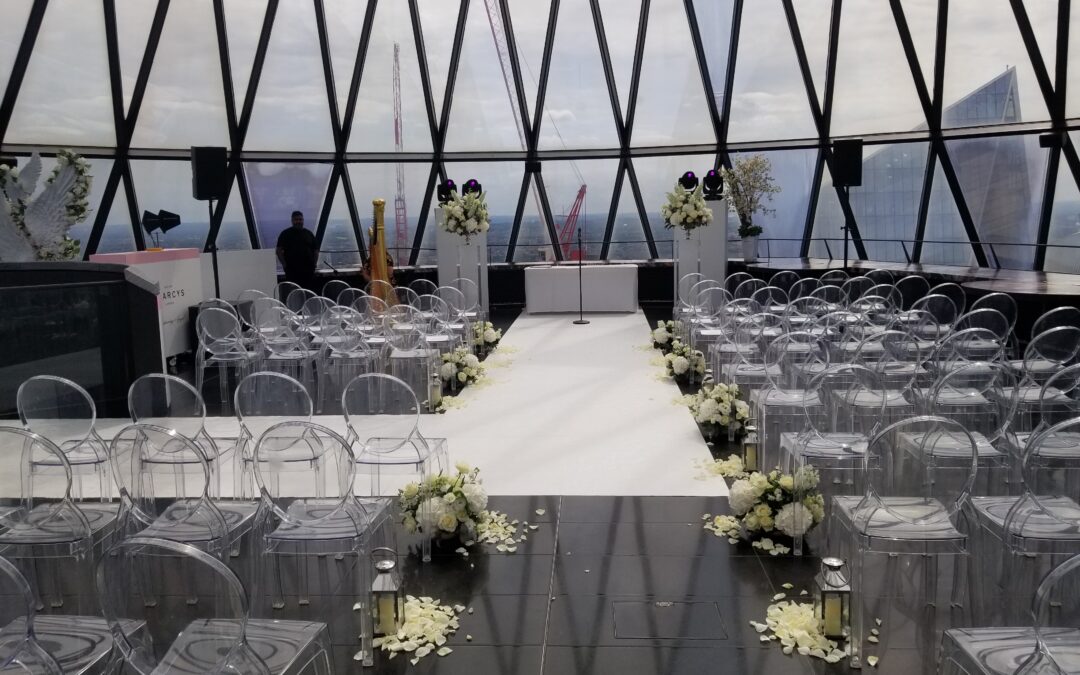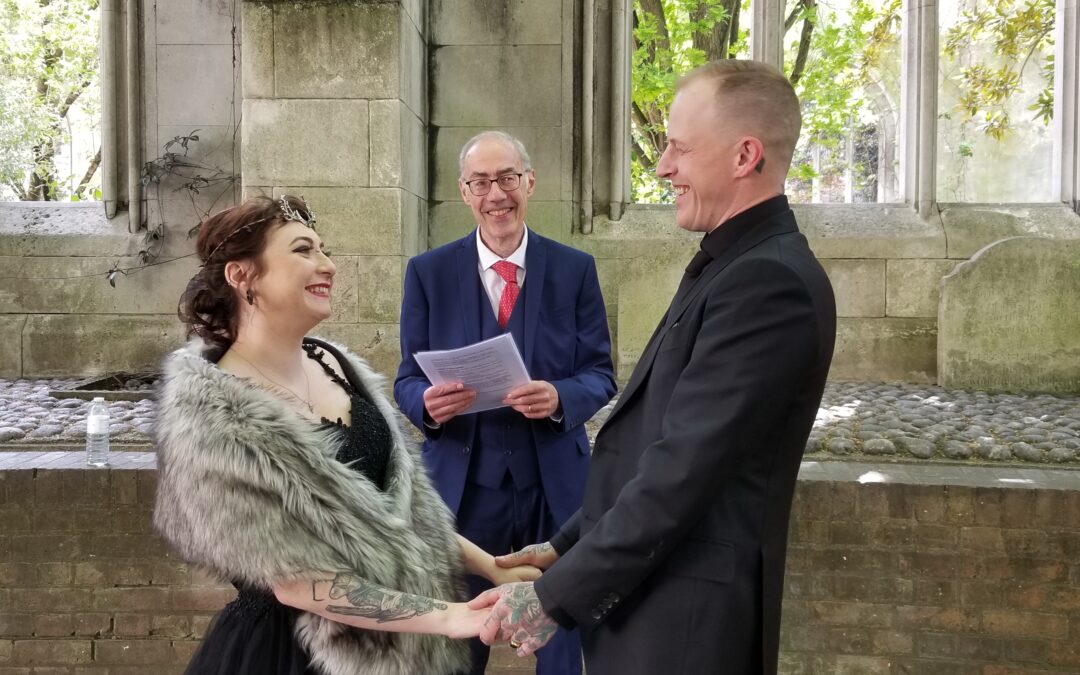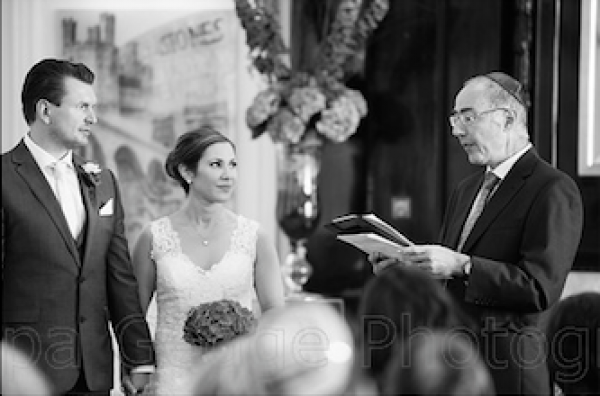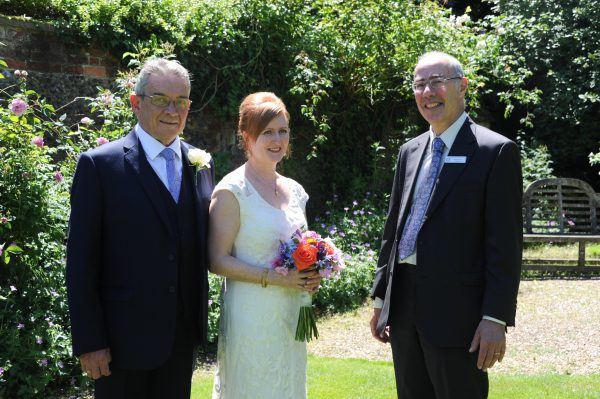
by Michael | Aug 23, 2022 | Blog
This may seem like an odd question! But you may need help deciding when to marry. By that I mean the most advantageous time, day and type of ceremony for you. (Not after downing half a dozen cocktails!)
The Ceremony
Proposals for new wedding legislation are going through parliament (slowly!) as I write. But we’re a few months away from any declaration and then the legal process won’t be that quick. So what follows is still up-to-date advice.
Register Office
Waters are slightly muddied these days, as Register Offices tend to be understaffed since COVID.
In principle, you can make an appointment, and go down there on the appointed day with two witnesses and have a 10-15 minute non-religious ceremony. That’s it.
Some registrars will come out to a licensed venue (at a significant cost) and conduct the wedding there, but this is not so easy to arrange nowadays, especially bearing in mind the staff shortages I referred to.
Alternative Ceremonies
Religious
Basically, nothing has changed regarding conventional church weddings, and that alternative is self-contained and standardised. You arrange this through your priest.
Part- or non-religious
For a unique, tailor-made service, you have a third alternative, which is where I could come in. A celebrant-led ceremony could contain as much – or as little – religion as you want, and also include rituals of your choosing. The whole service can be arranged according to your vision – even the venue. Your celebrant will be delighted to advise and guide you. Your ceremony can be as personalised as you wish.
When to Marry
As you might expect, peak periods (like July and August) tend to be more expensive. Weekends usually cost more, as do high season dates. Bank holidays and celebrations such as Valentine’s Day are likely to come out more expensive, and evenings can cost more than mornings/afternoons.
Whatever your choice, you will probably need to book well in advance, and give your guests plenty of notice. Especially if you’re opting for a destination wedding.
Discounts
It doesn’t normally hurt to ask suppliers if they’ll offer any reductions, especially if your event is out of season. They can only say no!
Conclusion
There’s plenty to think about, then, but I hope that these remarks shed some useful light, at least. You may need to be flexible and should certainly do some research, but the results can be so worthwhile.
Never forget that it is your big day, and you deserve to get it right.
Do speak to me. I’d love to help you further.

by Michael | Jul 18, 2022 | Blog
It means a lot when your efforts are not just taken for granted! Being appreciated means a great deal.
It is not as simple as it seems to be a celebrant. There are many elements that need to go together to create a successful ceremony.
The work is worthwhile, though, when the couple show their appreciation.
I’d like to give a flavour of what can be achieved. So today I shall simply share a short testimonial I received recently from a happy couple.
“Michael was so wonderful. We chose Michael to officiate our elopement in London immediately after we spoke with him the first time – he resonated much more with us and our very ambiguous ideas for a ceremony. He was so kind and patient, and helped us craft a truly unique and special ceremony. He helped guide us toward a ceremony with so much meaning and encouraged us to bring in our own elements. His words made both of us cry, and his presence and grace made our ceremony truly magical. We couldn’t thank him enough.”
Perhaps you can understand why, although I am relieved (only because of the weather forecast!) that I don’t have a ceremony to conduct this week, I am so looking forward to the next. Being appreciated like this is a huge motive force and is an adrenaline kick. (Yes, I admit it: I’m a bit of a junkie for that!)
So if you know of anybody that would like to share the delight that a memorable ceremony can engender, please pass my details on to them.
I am looking forward to being appreciated again!

by Michael | May 10, 2022 | Blog
When I performed my first elopement ceremony recently, a number of people were curious. Did this take place in secret? Were there elements that you wouldn’t have expected in a “normal” ceremony?
The circumstances were as follows: Anita and Bruce (not real names!) simply did not want razzamatazz. They definitely dreaded being the centre of attention. They got married officially in the States, where they live, but booked a photographer and myself to conduct what was to be the “real” wedding in London (where nobody else could follow them!).
They wanted a part-religious (spiritual rather than conventional) ceremony, so a celebrant made sense.
We all dressed up (I was a little more conventional!), as the photo shows.
Unusually for London, the weather played along, and it was a beautiful day. Also, the venue was very atmospheric: the lovely ruins of St Dunstans-in-the-East, near Tower Bridge.
The service had been agreed over the months and consisted of the following:
After a short introduction, I read a poem called “Why marriage?”, which seemed appropriate!
I then gave an address about the significance of marriage (not too heavy, though!) before moving on to the Exchange of Vows. Anita and Bruce chose to recite traditional vows, but also wrote their own. After agreeing the basics, they had composed their vows independently, and this was the first time either of them had heard what the other had prepared.
It was predictably moving and very beautiful.
Anita had written more of an essay (!), but what was clear – if it hadn’t already been – was that they were deeply in love and were absolutely serious about their relationship.
We then heard a poem “The Meaning” by Kellie Spehn before moving on to a Handfasting, preceded by an explanation of the ritual. The couple were bound together for a minute or so in an infinity knot.
Then it was time for the ring exchange before we concluded with the Blessings of Divine Qualities and the pronouncement allowing a kiss! (This was certainly the longest I have witnessed!
A round of applause from some (distant) onlookers followed, and we were done!
After a week in London, our couple returned to the States, to commemorate the event with a couple of (small!) receptions.
Their testimonial was heart-warming (“magnificent!”) and made me proud to have been part of such a joyous but significant occasion.

by Michael | Apr 25, 2022 | Blog
Just as there are many types of weddings, a mixed-faith service can vary ceremony by ceremony. Not just because the couples are different. Or because the religions highlighted might be different.
As with any celebrant-led ceremony, you can tailor the components to fit in with what you believe and want to include.
The ceremony can be 100% religious (or almost). I have conducted a couple of mixed-faith ceremonies, which were, to all intents and purposes, pretty much traditional Jewish wedding services (albeit with less Hebrew). In both cases, there was a Christian reading and/or prayer included. That’s how the couples wanted to play it out, and it worked.
In most cases, the couples want religious elements, despite not being active worshippers. In one case, it was simply to placate parents. Usually, it is because the couple, though not active participants, feel attached to their religion and want to include this as part of their important day.
There’s nothing to stop you mixing religious and pagan elements into one ceremony.
In all cases, the couples need to agree beforehand what they actually want. If they don’t, it’s a recipe for dis-harmony and potentially resentment. Of course, discussing things with the celebrant can clarify how things are going to appear on the day and make it easier to choose.
It may be that the couples want to clear things with their parents too. That’s fine, although you might be walking a tightrope here. Naturally, you want to please everybody (especially if your parents are helping to bankroll the event), but it is ultimately your day. You don’t want to get railroaded into doing what doesn’t sit comfortably with you.
One thing to bear in mind is how “heavy” you want the ceremony to be. For example, when I do a Jewish (or part-Jewish) wedding, I weigh up how much Hebrew should go in. You will need to decide on how many, and which, prayers you include. What sort of rituals will you put in? How about a few spiritual readings? Do you want a balance of religions, or is it OK, if things are a bit lop-sided?
Again, discussing this with your celebrant should illuminate things better for you. You could do worse than to have a word with me!
photo: Philippa Gedge

by Michael | Apr 11, 2022 | Blog
It’s understandable that I get asked what a civil celebrant actually is. I hope this blog will give you answers and paint a clearer picture, so you can see the potential benefits of working with one.
Here are a few questions I get all the time.
Are you a Humanist?
The short answer is “no”, but, in fact, I am much more than that. A Humanist is not supposed to include religious elements (or even the word “God”) in their service. However, if you want a secular service, you don’t need to resort to Humanists.
A civil celebrant can conduct a non-religious ceremony (as well as a part-religious or mixed-faith one). So that’s simple enough.
How much contact time is there between myself and officiant?
You will only meet the registrars for the first time at the marriage ceremony. The same may go for your vicar, if you’re having a church service. That’s not normally the case with a civil celebrant.
Apart from an introductory, discovery call (or visit) after your initial contact, you have access to your celebrant at all reasonable times from the time of booking until the day of the ceremony. So if you have queries or issues, it is easy to resolve them and you will feel more relaxed on the day because you will have established a close relationship with your celebrant.
How much control do I have over what goes into the service?
Only if you are working with a civil celebrant will you get free choice. Of course, you will also get guidance and advice, if wanted. Your ceremony will not be not standard or pre-ordained. You can have your own readings, vows or rituals – anything to make your ceremony personal and unique.
A church service is set in stone and the registrars offer a standard service, although sometimes they offer a modicum of choice.
So the content is basically unrestricted, if you work with a civil celebrant.
What about location and timing?
The church or Register Office ceremony is normally limited to “office hours”. A civil celebrant has no restrictions on when the ceremony can take place.
Likewise, with the location. A civil celebrant will conduct a ceremony for you almost literally anywhere. That’s clearly not the case with church weddings, and there are conditions to be complied with, in the case of Register Office services.
Hopefully, this will have clarified things a lot, but if you have further questions, please feel free to ask me!




